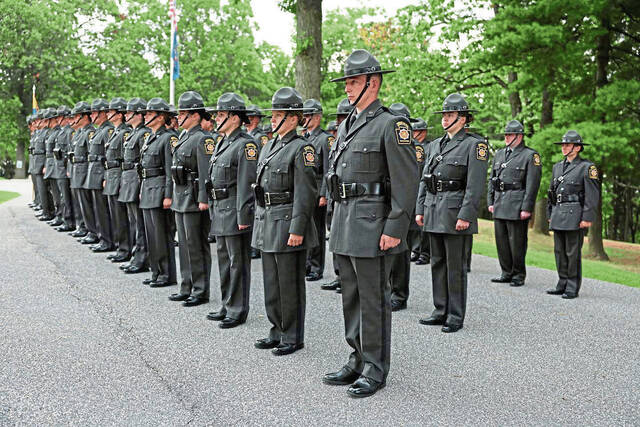https://mirror.triblive.com/local/regional/interest-in-local-police-work-drops-in-western-pa-despite-jump-in-state-police-academy-applicants/
Interest in local police work drops in Western Pa. despite jump in state police academy applicants

While the Pennsylvania State Police force is seeing increased interest from people wanting to become troopers, many suburban and rural departments in Western Pennsylvania are facing a challenge trying to attract new officers.
Last year, Murrysville received 18 applications from people interested in becoming police officers for the municipality — half as many as it did just two years earlier.
In New Kensington, the drop has been even more stark. Nine people applied to take the police exam there last year, down from 21 five years earlier, according to the city.
And in Delmont, the police department has shifted to a mostly full-time force to address high turnover and the challenge of retaining part-timers.
Chiefs say it is reflective of the staffing challenges local departments routinely face and a general decline in people turning to law enforcement as a career.
“Our biggest issue is finding people who want to police anymore,” said Penn Township police Chief John Otto.
Released last year, a Police Executive Research Forum survey of 182 departments showed the number of sworn officers had declined 5% between January 2020 and January 2023. Resignations climbed from 2,838 in 2019 to 4,175 in 2022, while retirements remained relatively steady, the report said.
In Delmont, a borough of about 2,500 people, police Chief T.J. Klobucar said his department has five full-time and two part-time officers. In the past, resignations of part-time officers were a fairly regular occurrence.
“Losing part-timers was a problem, because you’d train them, supply them with equipment and then they’d leave for a full-time position,” Klobucar said. “There’s a cost that comes with that.”
With the support of borough council, Klobucar said the department made a shift to a more stable staffing situation with more full-timers.
“We’ve also been lucky that we have a couple guys who are only looking to do part-time work,” he said.
Yet, he said he’s seen a decline in applicants for the civil service commission exams administered to potential hires.
Murrysville police Chief Tom Seefeld said he thinks there’s a general hesitation in becoming a police officer.
“There’s a lot of things that have changed over time,” he said. “It’s more dangerous now for police, and in some ways there’s been a drop in respect for police officers. I think there’s a multitude of reasons.”
In Murrysville, a starting officer’s salary is just over $88,000 per year, according to Seefeld. The department also requires new hires to have at least 2,080 hours of police work under their belt — essentially, a full year of experience.
“That helps us cut down field training time and get officers on the street, on their own, more quickly,” Seefeld said. “The negative side is that we can’t hire new police recruits.”
Southern Armstrong Regional police Chief Christopher Fabec said some recruits have expressed concern about the way some people in society view the police. A Murrysville resident, Fabec said he is trying to do many of the same things as Seefeld when it comes to changing that view.
“A big part of that is more community engagement,” Fabec said. “The better those relationships are, the more we can try to mend that view.”
In New Kensington, where just nine people applied to take the police exam last year, city Clerk Dennis Scarpiniti said interest is “certainly trending downward.”
“When I first started 30-plus years ago, I remember receiving 40-plus applicants for the police test,” he said. “We used the cafeteria at Valley High School to conduct the test.”
As for today’s smaller number, he said, “When you have such small numbers, it gets difficult when people fail the physical agility test or people are removed because of background problems.”
Similarly, Southern Armstrong Regional’s Fabec said, “We almost always average 12 to 15 (people) taking the test, but our last few (cycles) have been closer to 10. We’re not seeing a huge decline, but the pool has gotten smaller.”
Fabec, who also teaches at the police academy, has seen a drop in recruits there, as well.
It’s been a different story for the state police.
It has seen a bump in cadet applications since August when Gov. Josh Shapiro stopped requiring cadet candidates to have completed at least 60 college credits.
In the first half of last year, when the college-credit requirement was in place, state police received 1,374 applications from eligible candidates, according to the law enforcement agency.
In the first hiring period after the requirement was lifted, the agency said it received 1,545 applications from eligible candidates over just two months. During a second, three-month hiring cycle that ended Jan. 31, state police received 1,830 applications from eligible applicants.
Of the latest group of applicants, more than two in five — 41% — would not have been eligible to apply when the college-credit requirement was in place, according to state police.
The change has affected the Municipal Police Academy of Westmoreland County Community College.
“We’re actively recruiting for the program; however, with the recent change in degree requirements, we’ve seen a decline in enrollment,” Frank Newill, the academy’s director, said in a statement to TribLive.
Copyright ©2026— Trib Total Media, LLC (TribLIVE.com)
